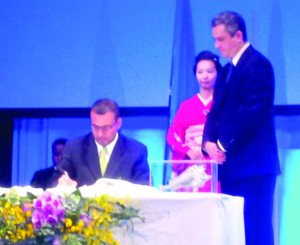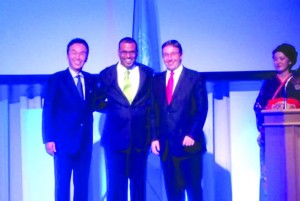– eyes 2022 as date for full phase-out
By Samuel Sukhnandan

The Guyana government has signed on to a new international pact to control mercury emissions – the Minamata Convention on Mercury. This was done during an international conference organised by the United Nations Environment Programme (UNEP) and held in Minamata, Japan from October 9 to 11.
Natural Resources and Environment Minister Robert Persaud signed the Minamata Convention on Mercury on behalf of the government. He was accompanied by the acting commissioner of the Guyana Geology Mines and Commission, Rickford Vieira.
Persaud stated that government recognised the environmental and health risks of mercury use and supported the implementation of a legally-binding global instrument on mercury that will examine its supply and trade, mercury-added products, manufacturing products in which mercury compounds are used, artisanal and small-scale mining, emission, releases, storage and mercury wastes.
Phased approach
He explained that at the forum, the Guyana government proposed a phased approach over a period of 10 years, which should give parties time to prepare for the implementation of the procedures and provisions. This approach, Minister Persaud stated, has been supported by the Guyana Gold and Diamond Miners Association (GGDMA), while discussions were held with Amerindian and riverine communities.

Minister Persaud further stated that Guyana has recognised the need to adhere to the principle of “common but differentiated responsibilities”. The Japanese government pledged its support to Guyana for phasing out the use of mercury.
During the trip, Persaud also held bilateral discussions with Japanese Environment Minister Nobuteru Ishihara, who reiterated his country’s plan to provide US$2 billion in financial assistance to fight mercury pollution. Discussions were also held with United Nations Environment Programme (UNEP) Executive Director Achim Steiner to lobby his support for the phasing-out measure.
An action plan was outlined by Guyana to minimise and, where feasible, eliminate the release of mercury into air, water, and onto land from waste, by adopting Environmentally Sound Management (ESM). It was proposed that the plan be implemented and completed within five years of its approval, preferably from 2013 to 2017.
2022 deadline
Last Thursday, Presidential Secretariat head, Dr Roger Luncheon told a news conference that government has now set a new deadline by which it wants to phase out the use of mercury – 2022.
According to Dr Luncheon, Cabinet has noted the negative impact mercury has on the environment and has been working hard to ensure that this goal is accomplished by the new deadline. This confirms with the terms of conditions set out by international bodies and likely to be achieved through hard work. Government has already started to look at mercury-free methods.
Minister Persaud had pointed out the socio-economic implications of a ban on the production and supply of mercury, which could affect approximately 100,000 persons, who directly or indirectly depend on the mining sector to earn a livelihood.
During May of this year, the World Wildlife Fund (WWF) presented government with US$12 million to work with nature conservation groups to research mercury use in Guyana and its alternatives, including gold washing, which was recently introduced in Guyana via shaking tables.



